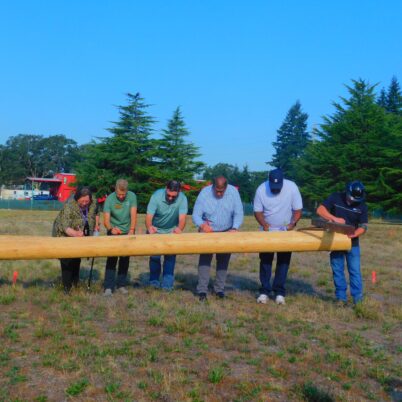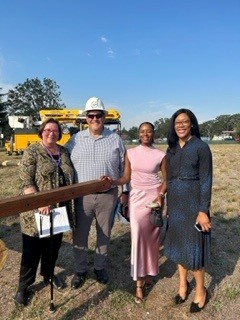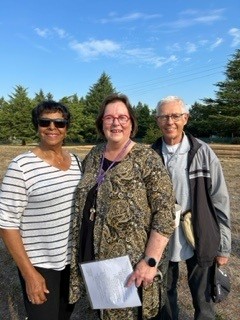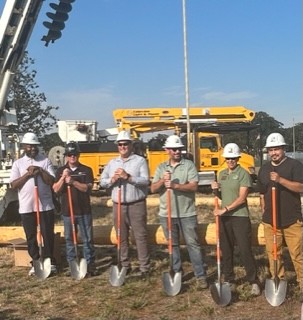Groundbreaking Celebrates Start of CPTC’s New Lineworker & Arboriculture Program
By Jenn Adrien
An August Start for CPTC’s Newest Program

On the morning of Tuesday, August 26, Clover Park Technical College broke ground on a new pole yard at its Lakewood campus, marking the launch of its new Lineman and Arboriculture program. The groundbreaking event brought together college and community leaders, industry partners, union representatives, and community members to celebrate the training opportunities this program will bring to the Puget Sound region.
The pole yard is located in the northwest corner of campus and is a hands-on training lab, designed to simulate the real-world conditions of linework. In time, the yard will feature as many as 70 poles of various sizes, types, and materials. Visibility from nearby streets, Steilacoom Boulevard and Lakewood Drive SW, will make the pole yard a prominent symbol of Clover Park’s commitment to workforce development.
“At Clover Park Technical College, we believe in the power of partnerships to open doors for students,” said Dr. Joyce Loveday, CPTC President. “This collaboration with our union partners is unlike anything we’ve done before, and it’s creating pathways into high-demand, well-paying careers that will benefit both our students and our region for years to come.”
The program responds to a critical regional need for skilled lineworkers, combining electrical line training with arboriculture skills to prepare graduates for a wide range of industry roles. Students will also have the option to earn a Commercial Driver’s License (CDL), certifying them to operate the heavy equipment used in the field.


Filling a Regional Training Gap
For years, the Puget Sound area has lacked accessible training programs for aspiring lineworkers. When International Brotherhood of Electrical Workers (IBEW) Local 483 member Alice Phillips was appointed to the CPTC Board of Trustees in 2021, she began advocating for the creation of a program that could produce the skilled lineworkers needed by industry. With millions of utility industry employees retiring by 2032, the “silver tsunami” presents a real threat to our nation’s infrastructure. Phillips, who has since retired herself, knew that being able to fill vacancies with skilled workers was critical to keeping the lights on.
In June 2024, Vice President for Instruction Tom Broxson and Dean of Trades, Transportation, and Apprenticeship Lester Burkes joined Phillips and Loveday for a meeting with Byron Allen, business manager for the International Brotherhood of Electrical Workers (IBEW) #483 for an exploratory conversation. Allen pointed out that the Joint Apprenticeship Training Committee (JATC) does precisely what Clover Park was proposing, training unionized members in linework and tree-trimming, offering classes in nearby Idaho and Oregon. Clover Park was uniquely situated to offer certifications for non-unionized students in Washington State. As an accredited public college, CPTC could offer students an academic career path that provides college credit as well as access to funding sources like federal financial aid and veterans benefits.
Allen was intrigued by the potential partnership. By the time the CPTC delegation had gotten into their cars, Allen had already called Terry Lowen, Director of the Northwest Line JATC and Vocational Outside Line Training Academy (VOLTA). Lowen drove the very next day to visit the Lakewood campus, where he scouted locations for the very pole yard that was made official at today’s groundbreaking. JATC not only picked the location for the pole yard, the organization paid for the poles and installation.
In Line with Industry Needs
 The curriculum for the Lineman and Arboriculture Program at CPTC mirrors the established VOLTA courses, and will be taught by journeyman-level members. Lester Burkes, Dean of the School of Trades, Transportation, and Apprenticeship led the work to translate the VOLTA classes to CPTC courses that would earn college credit. Graduates will have had experiences in both utility linework and tree management, giving them a powerful combination of skills that are in high demand across the Pacific Northwest and beyond. Whether graduates are restoring power after a storm, clearing vegetation to prevent wildfires, or installing telecommunication lines across the region, they will find a wide variety of union and non-union positions where they can make a living wage.
The curriculum for the Lineman and Arboriculture Program at CPTC mirrors the established VOLTA courses, and will be taught by journeyman-level members. Lester Burkes, Dean of the School of Trades, Transportation, and Apprenticeship led the work to translate the VOLTA classes to CPTC courses that would earn college credit. Graduates will have had experiences in both utility linework and tree management, giving them a powerful combination of skills that are in high demand across the Pacific Northwest and beyond. Whether graduates are restoring power after a storm, clearing vegetation to prevent wildfires, or installing telecommunication lines across the region, they will find a wide variety of union and non-union positions where they can make a living wage.
“For years, there hasn’t been a local program to train the next generation of lineworkers,” explained Burkes. “This fills that gap, giving students the hands-on skills and safety training they need to step straight into the workforce.”
John DeVore, General Manager at Lakeview Light & Power, agrees. “Lakeview Light & Power has been serving its community for over 100 years,” he said. “We are proud to support a local program that provides better visibility and opportunity for careers within the skilled trades, especially those related to the electric distribution line trade. This program will provide local utilities with another resource to hire employees who already understand the demands and safety requirements of the job. It’s a win for the students, employers, and communities we serve.”
Lakeview Light & Power has a long-standing relationship with CPTC as both the college’s service provider and a strong supporter of its students and graduates. For many years, the company’s board has awarded scholarships to CPTC students to help them stay in school and succeed. DeVore is serving on the initial advisory committee that provided input and guidance as the Lineworker degree was being developed. Lakeview Light & Power is among the region’s employers who will look to hire program graduates in the future.
“This is a historic event,” said Trustee Phillips. “In collaboration, unions, technical colleges, and management of construction companies are collectively establishing a viable pathway toward a sustainable, living-wage career. By changing the landscape of our community and eliminating barriers to apprenticeship programs, we can create a more equitable and sustainable future for all.”
 To learn more about the Lineman and Arboriculture program, visit cptc.edu/lineworker.
To learn more about the Lineman and Arboriculture program, visit cptc.edu/lineworker.